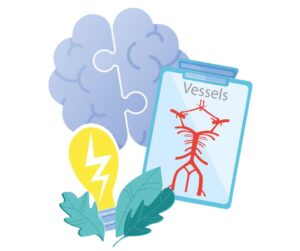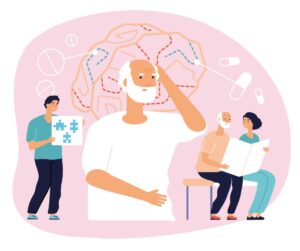Vascular dementia
What is Vascular Dementia?
Vascular Dementia is caused by reduced blood supply to the brain due to diseased blood vessels. To be healthy and function properly, brain cells need a constant supply of blood to bring oxygen and nutrients. Blood is delivered to the brain through a network of vessels called the vascular system. If the vascular system within the brain becomes damaged – so that the blood vessels leak or become blocked – then blood cannot reach the brain cells and they will eventually die.
This death of brain cells can cause problems with memory, thinking or reasoning. When these cognitive problems are bad enough to have a significant impact on daily life, this is known as vascular dementia.

What are the types of Vascular Dementia?
There are four types:
- Stroke-related Dementia
- Post-stroke Dementia
- Single-infarct and Multi-infarct Dementia
- Subcortical Dementia
What are the common symptoms?
How vascular dementia affects people varies depending on the different underlying causes and more generally from person to person. Symptoms may develop suddenly, for example after a stroke, or more gradually, such as with small vessel disease. Some symptoms may be similar to those of other types of dementia but others are different.

What are common symptoms in the early stages?
Whilst memory loss is common in the early stages of Alzheimer’s, it is not usually the main early symptom of vascular dementia. The most common cognitive symptoms in the early stages of vascular dementia are:
- problems with planning or organising, making decisions or solving problems
- difficulties following a series of steps (eg cooking a meal)
- slower speed of thought
- problems concentrating, including short periods of sudden confusion. A person in the early stages may also have difficulties with:
- memory – problems recalling recent events (often mild)
- language – eg speech may become less fluent
- visuospatial skills – problems perceiving objects in three dimensions.
As well as these cognitive symptoms, it is common for someone with early vascular dementia to experience mood changes, such as apathy, depression or anxiety. Depression is common, partly because people with this condition may be aware of the difficulties it is causing. A person with vascular dementia may also become generally more emotional. They may be prone to rapid mood swings and being unusually tearful or happy.

What are the symptoms of stroke-related dementia and Subcortical dementia?
Stroke-related dementia often progresses in a ‘stepped’ way, with long periods when symptoms are stable and periods when symptoms rapidly get worse. This is because each additional stroke causes further damage to the brain. Subcortical vascular dementia may occasionally follow this stepped progression, but more often symptoms get worse gradually, as the area of affected white matter slowly expands.
What are the symptoms in the later stages of vascular dementia?
Over time a person with vascular dementia is likely to develop more severe confusion or disorientation, and further problems with reasoning and Vascular Dementia communication. Memory loss, for example for recent events or names, will also become worse. As vascular dementia progresses, many people also develop behaviours that seem unusual or out of character. The most common include irritability, agitation, aggressive behaviour and a disturbed sleep pattern. Sometime a person may also act in socially inappropriate ways.
Occasionally a person with vascular dementia will strongly believe things that are not true (delusions) or – less often – see things that are not really there (hallucinations). In the later stages of vascular dementia someone may become much less aware of what is happening around them. They may have difficulties walking or eating without help and become increasingly frail. Eventually, the person will most likely need help with all their daily activities.
Our approach to dementia care at Four Seasons Health Care Group.
Get in touch
If you have any questions about our care or services, please get in touch below.
Please note that we cannot respond to queries about application process, or current vacant positions. Please visit our careers website for information about working with us or current vacancies.
